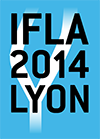
80th IFLA General Conference and Assembly
16-22 августа 2014, Lyon, France
Call for Papers
Preservation and Conservation Section
& Information Technology Section
& National Libraries Section
Theme:
Digital preservation of eBooks: Best practice in libraries
During the last years we have witnessed the growth of the eBook market. This new publishing format seems to be a big challenge to the existing models, concepts and workflows of digital library services. Undoubtedly, eBooks are part of our cultural heritage; however, many questions about their digital preservation have to be answered. In this respect, libraries have to find fundamental and pragmatic answers to address new data formats, ways of access and different legal and technical approaches of eBooks' preservation. This joint session of the Preservation and Conservation Section, the Information Technolgy Section and National Libraries Section will present different views, solutions and innovative organizational models around eBooks in libraries.
Themes & Topics
Areas of interest for papers include, but need not be restricted to, the following:
Legal and organizational issues:
- Legal issues: How to define an eBook in legal terms? How to organize their (legal) deposit in the light of existing legislation? How to cope with copyright restrictions?
- Models of cooperation with publishers: How to identify the right(s) spokeperson(s) in the eBooks management/selling workflow? How to build confidence with publishers?
- Organizational models: where to build an eBooks legal deposit entity and repository (in the IT department, in the legal deposit or collection department…)? How to involve curators in eBooks promotion (e.g. in reading rooms and remote services), management and preservation? Are there specific skills required to manage eBooks?
- How does eBook management fit in the wider legal deposit organization for digital material: eBooks on media, e-periodicals, web archives? Do we need changes in our workflow organization?
Technical issues:
- Issues related to eBook formats: How to deal with technical diversity of e-books? Which formats should preferred or rejected for collection and preservation purposes? How to manage complex eBook formats (e.g. EPUB3 allows inserting videos or interactive files)?
- Issues related to metadata formats: How to use publishers' metadata formats to automate bibliographic description? How to distribute and share eBook bibliographic descriptions (for other libraries, in linked open data, etc.)?
- Issues related to Digital Right Managements (e.g. the main eBook sellers are probably a obstacle to their preservation)
- Issues related to access and long term preservation of eBooks: what tools are needed to access and read eBooks, in reading rooms or remotely, now and in the future?
Submission Guidelines
Proposals for papers should be no more than one page in length. If selected, speakers will have to submit the full paper before 15 May 2014 according to IFLA paper guidelines (to be published on IFLA web site http://www.ifla.org/officers-corner/key-documents). They will have 15 minutes to present their results and 5 minutes for a question and answer period during the conference session.
Proposals should include the following information:
- Name, title, and institution of speaker(s)
- Title of proposed presentation
- Address and email address of speaker(s)
- Brief biographical statement about each speaker including information about the qualifications of the speaker to address the proposed topic
- One or two paragraph discussion of the main points of the paper including an outline of the takeaways a conference attendee will obtain by having the topic presented at the conference
- Language of presentation
- Contact information for response to the proposal
Proposals should be sent by 9 February 2014 to:
Alenka Kavčič-Čolić
Email: [email protected]
The subject line of all submissions should be "IFLA_ebooks_" followed by your last name. For example, "IFLA_ebooks_ KavcicColic"
The contact person for each proposal will be informed by 14 March 2014 whether their proposal has been accepted or not. Papers selected for inclusion in the program must be submitted in one the official languages of IFLA by 15 May 2014.
Please note:
- The committee is looking for papers that present real-world solutions. Papers that focus on solutions that are usable in multiple library contexts will receive higher consideration for inclusion in the conference program. Papers that are strictly theoretical or inapplicable to other environmental contexts are less likely to be accepted for inclusion in the program.
- Every paper accepted must be presented in person by one of the authors at the WLIC in Lyon, which takes place from 16 - 22 August 2014.
- Authors are required to permit non-exclusive publication of papers chosen for this session on the IFLA website and digital library. Papers that are accepted but not presented in person at the conference will not be made available on the official conference website nor will they be considered for nomination as a best paper of the conference.
Important Deadlines
| 9 February 2014 | Deadline for submitting proposals |
| 14 March 2014 | Notification of acceptance of proposal |
| 15 May 2014 | Submission of the full paper |
Submissions
All proposals must be in before 9 февраля 2014.
Please note
All expenses, including registration for the conference, travel, accommodation etc., are the responsibility of the authors/presenters. No financial support can be provided by IFLA, but a special invitation can be issued to authors.
Congress Attendance Grants
The French National Committee and IFLA have worked hard to secure funds for Conference Participation Grants. Up-to-date information will be available on our Conference Participation Grants webpage.
Last update: 7 January 2014


